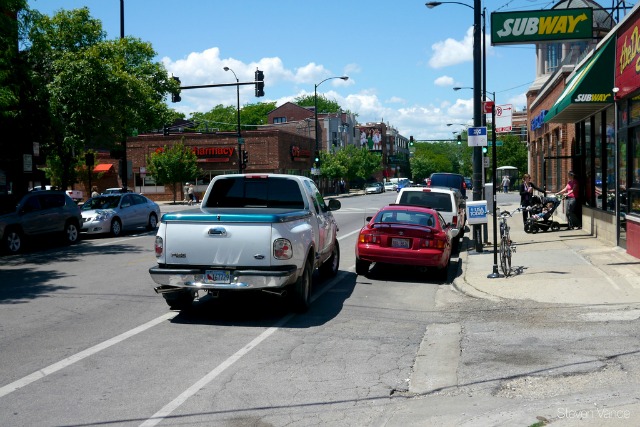New Campaign Aims To Curb Dangerous Bike Lane Blockers
By Stephen Gossett in News on Aug 24, 2016 9:57PM

Photo: Steven Vance
Many bicyclists in Chicago have done yeoman’s work for years to publicize and take corrective action against construction and parked cars that are spotted illegally blocking bike lanes. In the wake of two recent bike fatalities—one in which the cyclist was approaching a construction-related blockage in the bike lane—a local bicycling advocacy organization has rolled out a watchdog campaign targeting such obstructions.
Active Transportation Alliance introduced Clear the Way on Tuesday, urging Chicagoans to call 311 and send photos and a brief description to ATA when they encounter dangerous blockages on bike lanes and sidewalks or unsafe pavement.
Kyle Whitehead, Government Relations Director of ATA, said the problem has become more visible, even if it's not new.
“It’s been an issue for some time, but it has become more apparent over the last few months,” he told Chicagoist. “The warmer weather brings construction season. Whether it's larger development projects or city utility work, there’s a lot going on. Those type of projects aren’t new but the quantity has gone up.”
But even before Clear the Way, Chicago bicycling advocates have long been striving to fight dangerous obstacles. Twitter users employ the hashtag #enforce940060, a reference to the pertinent city ordinance, to notify CDOT, the mayor and aldermen. As Streetsblog reported, such users recently prompted the closure of an unsafe construction project that made bike-lane travel unsafe on a busy portion of Randolph Street in the Loop. The local Chainlink message board has also collected instances in a thread since early this year.
Although long an issue within the cycling community, the problem became more widely publicized after the death of Lisa Kuivinen. The 20-year-old art student (who uses they/them pronouns) was fatally struck by a 18-wheel flatbed truck along Milwaukee Ave.—one of the busiest bike-traffic corridors in America—while they approached a blockage caused by the construction of a transit-oriented development at 830 N. Milwaukee Ave. Kuivinen was riding in the bike lane when the driver of the truck crashed into them. The very next morning, a truck was parked in the bike lane near the crash site, according to a DNAinfo report.
Whitehead said the ATA campaign was motivated by a general need to improve safety not any particular incident. “There’s a general awareness that we all need to do better,” he said.